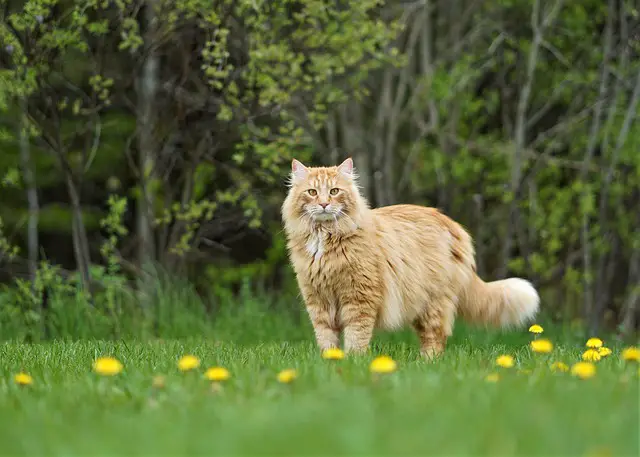Can cats eat ginger?
I love spoiling my cat and that means I am always looking for foods to feed her so she can live a long and healthy life.
I am sure it is the same with all people having furry babies in their homes.
Naturally, it is important to know which table scraps and human foods are good for our kitties and ones that are harmful and toxic.
Thankfully, ginger belongs to the ‘safe’ list. This means that you can safely feed ginger to your cat and it can even help in calming its tummy.
In this guide, I will talk about ways to feed ginger to your kitty in addition to answering the important question – can cats eat ginger safely?
Also Read: Can Cats Eat Black Beans
Can Cats Eat Ginger

Yes, ginger is one of the ‘safe’ human foods cats are allowed to eat.
Technically, ginger is herb and it has been used for millennia to curb upset stomach, indigestion, nausea, and vomiting in humans.
The same benefits can extend to our feline companions as well.
Ginger has numerous medicinal benefits and is completely safe and non-toxic.
In the next section, we will discuss some health benefits cats can reap by consuming ginger in moderate quantities.
Don’t forget to check out my related guides on:
Can Cats Eat Ginger and What Are Its Health Benefits?

Yes, to reiterate, cats can safely consume ginger.
Many cat food manufacturers are adding ginger to cat food to not only enhance its taste but also make it healthier and easier to digest.
Here are some of the health benefits of ginger for cats:
1. Powerful medicinal herb
Ginger’s main power comes from its gingerol content. Gingerol is a natural oil present in ginger. It is what imparts this herb its unique spicy and aromatic taste and flavor.
Moreover, gingerol also provides most of ginger’s medicinal properties that are so beneficial to humans and animals.
Ginger root has been used for centuries to calm nausea and settle the stomach. In addition, this medicinal herb can refresh the body and mind and even sharpen the brain.
These health benefits can even be extended to our cats.
2. Can treat nausea and reduce episodes of vomiting in kitties
Ginger can help our kitties curb vomiting.
If your cat suffers from chronic vomiting episodes, then ginger could come to its rescue.
Adding a little amount of ginger to your cat’s food can help eliminate nausea, vomiting, and other symptoms of upset stomach.
What’s more, you can even extend these benefits to cats that have just had surgery and are nauseous due to the effects of anesthesia.
Also Read: Best Cat Food for Vomiting
3. Can help in weight loss and weight management
Rats and mice that were fed ginger water in a laboratory study lost plenty of body weight despite being fed a high-fat diet.
In the same way, our cats benefit from this herb. If your pet is a bit overweight, try adding some ginger to cat’s diet.
Also Read: Best Cat Food for Overweight Indoor Cats
4. Could prevent osteoarthritis
Studies suggest that ginger’s anti-inflammatory properties can be effective in reducing symptoms of osteoarthritis.
5. Might help diabetic cats
Ginger regulates blood sugar levels which can help cats with diabetes. This can also benefit heart health.
6. Aids digestive health
Ginger helps speed up the emptying of the stomach. Regular consumption of ginger water can help your cat having constipation, indigestion, and other digestive upsets.
If your cat has sensitive digestion, then ginger can help settle its tummy and prevent discomfort.
Also Read: Best Cat Food for Gassy Cats
7. Could prevent certain feline cancers
There’s some evidence, although limited, that ginger has certain compounds including gingerol which could reduce the risk of certain cancers including colorectal cancer, liver cancer, and even ovarian cancers.
8. Anti-anxiety remedy
Is your cat anxious or stressed all the time? Does it get agitated during car trips, thunderstorms, vet visits, fireworks, etc.?
Then ginger could help. The spice is known to have anti-anxiety properties which can come to your pet’s rescue during these stressful events.
Also Read: Best Cat Carrier for Long Distance Car Travel
So, Can Cats Eat Ginger?
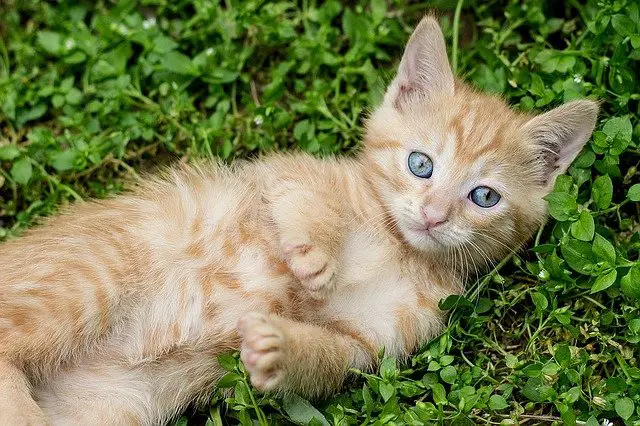
Yes, the bottom line is that cats can eat ginger or zingiber officinale safely.
It can help calm their upset tummy, aid digestion, regulate bowels, keep it regular, curb nausea, and even reduce your pet’s anxiety.
However, if your cat does not like ginger’s taste, then you need not force it to have ginger. Remember: your cat is getting most of its nutrition from its cat food. It does not need any human foods separately.
Later on in this guide, I will talk about how to feed ginger to your kitty. But if your cat isn’t too fond of it, then please do not force it to eat ginger.
We all know how picky our cats can be, and we certainly do not want to upset them.
Also Read: Best Cat Food for Cats That Throw Up
What are Potential Risks of Cats Eating Ginger?
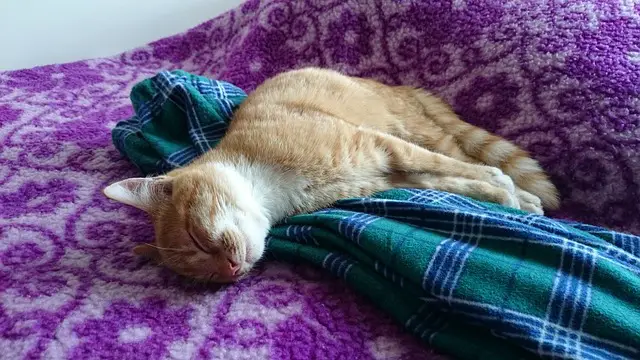
There are no risks or adverse effects associated with cats consuming ginger – as long it is in moderate quantities.
You can safely feed this herb to your pet, albeit in moderate quantities. If your cat does not like the taste or throws up after eating ginger, then please discontinue use.
When in doubt, consult a vet. Here are some negative effects associated with ginger consumption:
Ginger contains salicylates
Salicylates are blood thinners. In excess, these compounds can pose a harm to cats having bleeding disorders. So limit feeding ginger to your pet.
Diarrhea
In excess, ginger water or ginger tea can cause loose or runny stools in humans and animals. Some people are also known to suffer from gas, indigestion, and abdominal pain.
While we cannot attribute these symptoms to ginger alone, it is best to limit consumption.
Also, most cats never face these issues after having ginger, but if your otherwise normal cat starts showing these signs, you might want to avoid feeding it, at least for a few days.
Heartburn and throat irritation
Ginger has a burning, spicy, and acrid taste when consumed it as is. Your cat could also feel the same. So, avoid feeding ginger as is since it could cause burning in the mouth, throat, and even stomach or mild gastrointestinal irritation.
Can Cats Eat Gingerbread Too?

I love baking gingerbread every winter – the aroma fills up my home making it more welcoming for the upcoming Holiday Season. My cat waits patiently on the counter for some delicious tidbits.
The thing is, gingerbread does not always contain ‘real’ ginger. Most bakers add ginger extracts to their baked goods and not real ginger.
Ginger extracts are not the same thing as ginger, so it is best to avoid feeding commercial gingerbread to your pet.
Moreover, gingerbread also contains a lot of sugar. Sugar, in excess, can cause many harmful symptoms in your cat including a spike in blood sugar, type 2 diabetes, dental problems, and even heart issues in the long run.
Gingerbread often contains flour made from grains, herbs, spices, and flavorings which can affect a sensitive cat’s digestion and mess it up.
Therefore, I would not recommend feeding gingerbread to cats.
Also Read: Best Soft Dry Cat Food for Cats with Bad Teeth
Can Cats Eat Ginger Snaps?

The same thing is true for ginger snaps.
Ginger snaps or ginger cookies are great to dip in your tea for a refreshing afternoon snack – but only for humans. The same isn’t applicable to our cats.
Ginger snaps are made using all-purpose flour, pumpkin spice, preservatives, artificial flavorings, sugar, ginger extract, and so on. Some even contain artificial sweeteners like xylitol. Xylitol is toxic to cats and dogs as well.
This ingredient can upset your cat’s digestion and could even lead to diarrhea, vomiting, constipation, abdominal pain, and other debilitating symptoms.
So avoid feeding ginger snaps to your pet no matter how much it begs for them. Use cat treats instead.
Check out: Best Grain Free Kitten Food
Can Cats Eat Ginger Flowers and Leaves?

Ginger plant, flowers and ginger leaves are not toxic or poisonous to cats. However, you must note that there are many different varieties of ginger flowers available in nature.
Some like the ginger lily are quite safe for cats – in small quantities of course.
However, a few other varieties of ginger flowers are similar to lily which can be toxic to cats.
That is why, you must only feed ginger root to your kitty and avoid the leaves and flowers unless your vet or an experienced herbalist Okays the same.
How Much Ginger Can My Cat Eat Daily?
Always administer any food based on your cat breed weight.
Don’t forget the fact that just because something is natural, you can feed it freely to your pet without any adverse reaction.
In most cases, it is best not feed more than ½ a teaspoon of grated fresh ginger to your kitty on a daily basis.
As always, when in doubt – consult a vet before feeding anything new to your cat.
In the next section, I will tell you exactly how to feed ginger to your cat.
How to Feed Ginger to Your Cat?

Never feed ginger to your cat on an empty stomach. This spicy herb can cause gastric irritation and could even cause a burning sensation or abdominal pain.
Here are some ways to safely feed ginger to your cat:
Grated or chopped ginger root
Ginger root is readily available in farmer’s markets and grocery stores.
Grate or chop it up into tiny pieces or make a paste of the root. Add a tiny bit of this to your pet’s food.
Ginger ale/ginger tea
Boil 1 cup of water with a teaspoon of grated ginger root until it is reduced to half.
Cool completely and then administer this homemade ginger ale or ginger tea to your cat. (Do not feed commercial ginger ale to cats.)
Ginger powder
You can also add ginger powder to your pet’s dry cat food or canned food.
Ginger powder is easily available in stores. You can also make ginger powder at home.
Tinctures, pills, ointments
Some pet stores keep tinctures, ginger capsules, ointments, and teas containing ginger but you must consult a vet before using these for your cat.
What Other Herbs Are Safe Your Cat?
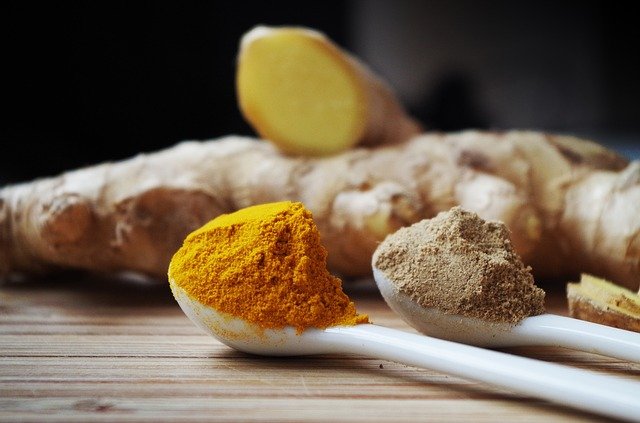
In addition to ginger, here is a list of cat-friendly herbs that you can safely administer to your pet:
- Valerian
- Witch hazel
- Echinacea
- Dandelion
- Cat’s Claw
- Licorice root
- Catnip
- Calendula
- Turmeric
Which Herbs and Spices are Unsafe for your Cat?
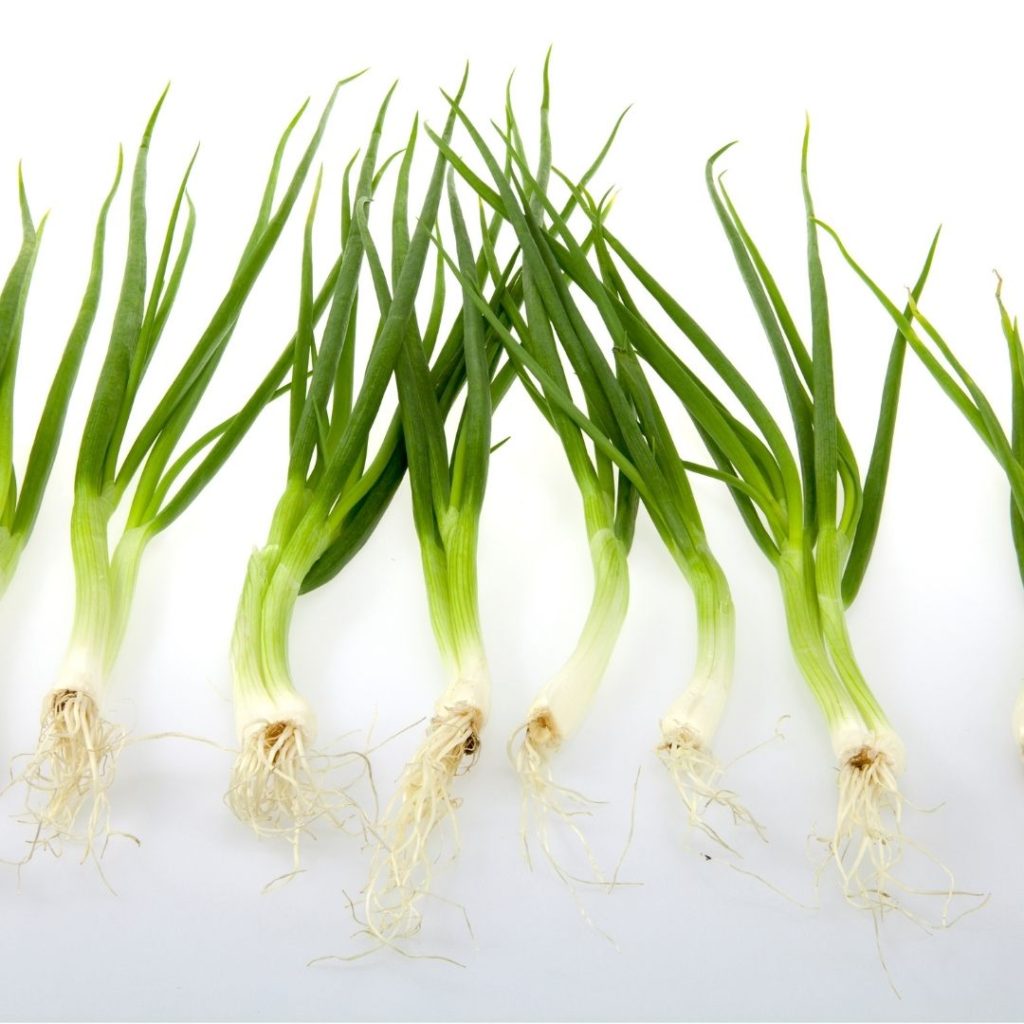
Here are some herbs and spices you should NEVER feed your Kitty:
- Chives, onions, garlic, leeks
- Chamomile
- St. John’s Wort
- Lemongrass, mint, tarragon
- Oregano
FAQs on Can Cats Eat Ginger
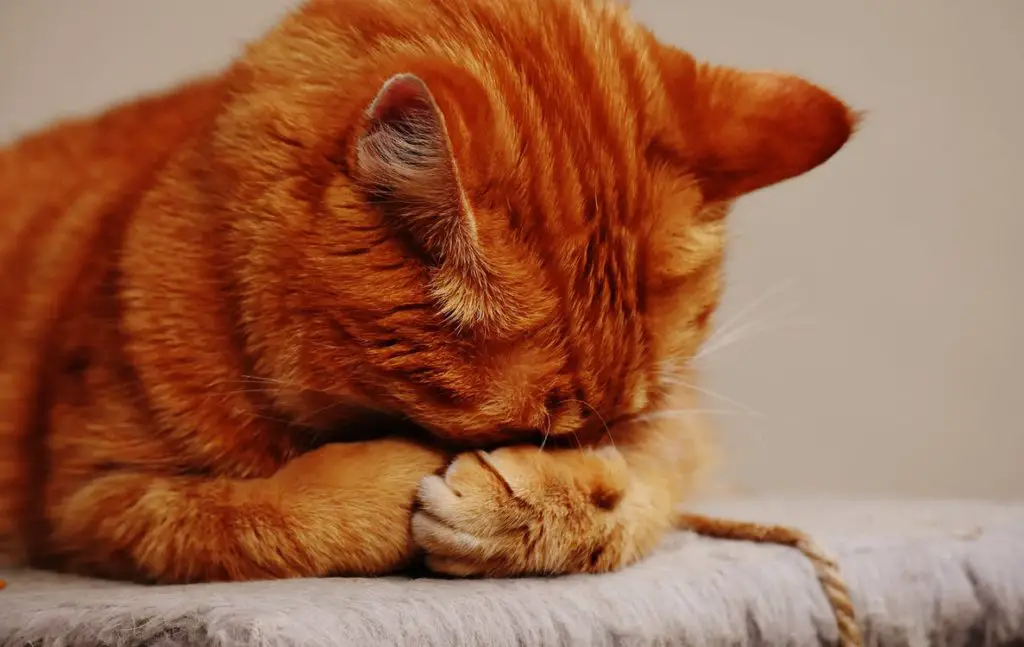
1. Is ginger toxic or poisonous to cats?
No ginger is not toxic nor poisonous to cats. You can safely administer it to your kitty to settle its upset stomach, nausea, indigestion, etc.
2. Is ginger safe for all pets?
Ginger is mostly safe for cats, dogs, and other small pets. You must make sure to administer it according to their body weight only.
3. Can I give garlic to my cat?
No. you must never feed garlic to cats. Garlic contains allium as well as thiosulfates and disulfides which are toxic and poisonous to cats. They can cause debilitating symptoms in cats such as vomiting, diarrhea, and even a condition called hemolytic anemia.
If you suspect your cat has consumed garlic, please see your vet right away.
4. What is toxic to cats?
In addition to certain human food and medicines, many household cleaners and detergents are toxic to cats. Also, some essential oil can cause poisoning in cats and can even be fatal. Check out the complete list of toxins for cats here.
Conclusion
Can cats eat ginger?
Yes, cats can eat ginger in small amounts. Anecdotal evidence suggests that ginger can curb nausea and vomiting in felines and could even settle motion sickness, anxiety, upset cat’s stomach, and diarrhea.
As with any new food, please exercise discretion when feeding ginger and when in doubt, consult your vet.
